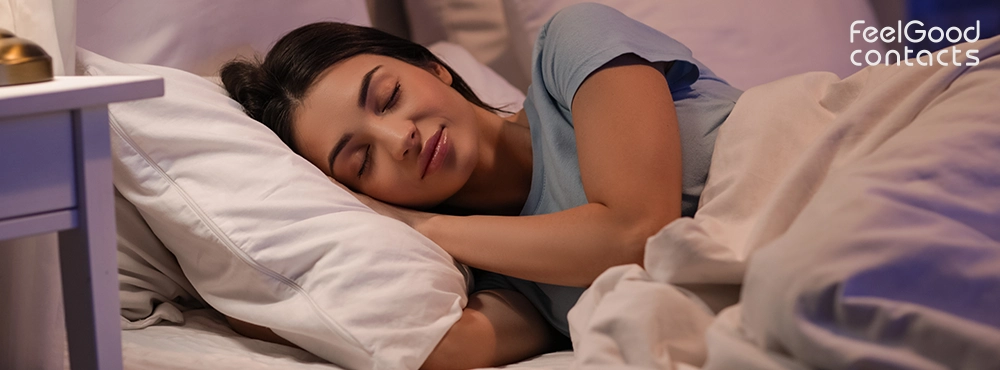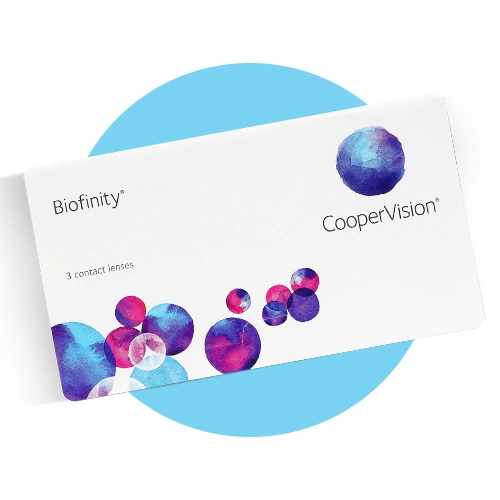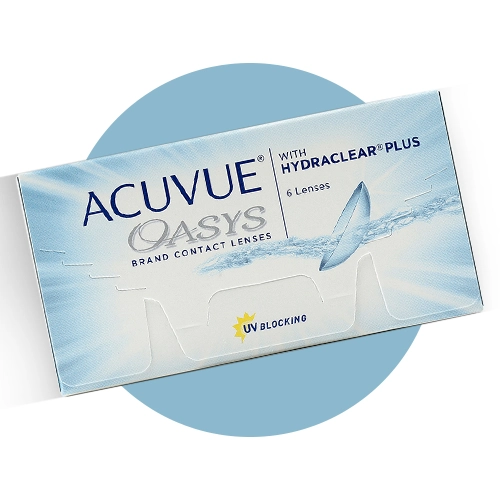Wearing contact lenses can offer clear vision and freedom from glasses, but what happens when you forget to take them out before bed? Whether you're new to lenses or a seasoned wearer, chances are you've wondered: Can I sleep with contact lenses in? It's a common concern, especially after a long day when dozing off feels all too easy. While it may not seem like a significant issue, sleeping in contact lenses without your optician's advice can lead to serious eye health problems.
Read on to learn about the risks associated with sleeping with your lenses in, and if you must wear your contact lenses while sleeping for any reason, what options are available for you.
Can you sleep with contact lenses in?
No, you aren’t supposed to sleep with your contact lenses, unless your optician has specifically prescribed lenses approved for overnight wear. Sleeping in contact lenses that aren't designed to be worn overnight can reduce the amount of oxygen reaching your cornea. This can increase the risk of eye infections, dryness, and irritation.
Even short naps with contact lenses can pose similar risks. You may think a quick snooze won’t be harmful, but your eyes still experience reduced oxygen while closed. Removing your lenses before any nap, no matter how short, is always the safer option.
Risks associated with sleeping in contact lenses
The British Contact Lens Association (BCLA) advises that sleeping in contact lenses increases the risk of eye infection, regardless of the type of lens. They also recommend avoiding sleeping in extended-wear lenses if you are unwell. Research consistently shows that overnight lens wear is among the top risk factors for serious eye complications and issues. Some of them are:
- Eye infections: Sleeping in contact lenses increases the risk of eye infections like bacterial keratitis. If untreated, these can cause severe pain, redness, and potential irreversible vision loss.
- Corneal hypoxia: Contact lenses can limit oxygen to the cornea. A majority of daily wear contacts allow a safe and healthy amount of oxygen to reach the cornea when worn during the day. However, when these lenses are worn overnight, the amount of oxygen is not enough. This can lead to a reduced oxygen supply, discomfort, swelling, and can even cause serious damage over time.
- Dry eyes: Wearing contact lenses while sleeping may cause or worsen the dry eye syndrome. An insufficient oxygen supply to your eyes can decrease tear production and affect your tear film, leading to issues such as itchiness, redness, and blurred vision.
- Giant Papillary Conjunctivitis (GPC): Giant Papillary Conjunctivitis (GPC) is a condition characterised as an allergic reaction, mainly triggered by contact lenses. It typically occurs due to factors such as excessive lens wear or wearing them while sleeping. This reaction leads to irritation and inflammation of the conjunctiva, which is the membrane covering the white part of the eye and the inside of the eyelids.
What to do if you accidentally sleep with lenses in?
Although it is highly recommended not to sleep with your contact lenses in, accidents can still occur. If you wake up with your contacts still in, don't panic or try to remove them immediately. While you sleep, your lenses may become drier and tighter, causing discomfort and increasing the risk of corneal damage. Start by blinking to moisten your eyes. You can also use rewetting eye drops to lubricate your eyes. Once the lenses feel moisturised again, wash and dry your hands, then gently remove them. Watch for symptoms like redness, pain, blurred vision, or discharge. Consult an optician if anything feels off or uncomfortable.
After removal, consider using hydrating eye drops to reduce symptoms of dryness. Leave your lenses out for the rest of the day if possible, or at least a few hours is recommended. If discomfort or visual issues persist, consult your optician or healthcare provider to rule out any underlying damage.
Contact lenses you can sleep in
There are contact lenses that can be worn while sleeping, known as extended wear lenses. These are typically made from breathable silicone hydrogel materials that allow more oxygen to pass through. Some of these lenses are designed for continuous wear up to 6 or even 30 nights. However, you must get approval from your optician if you are considering overnight wear lenses. These lenses require even more regular checkups to ensure your eyes remain healthy.
At Feel Good Contacts, we offer a wide range of extended wear lenses from popular brands at prices up to 50% lower than those of high-street opticians.

 Offers
Offers Account
Account
 Favorite
Favorite
 Basket
Basket

 OFFERS
OFFERS


















